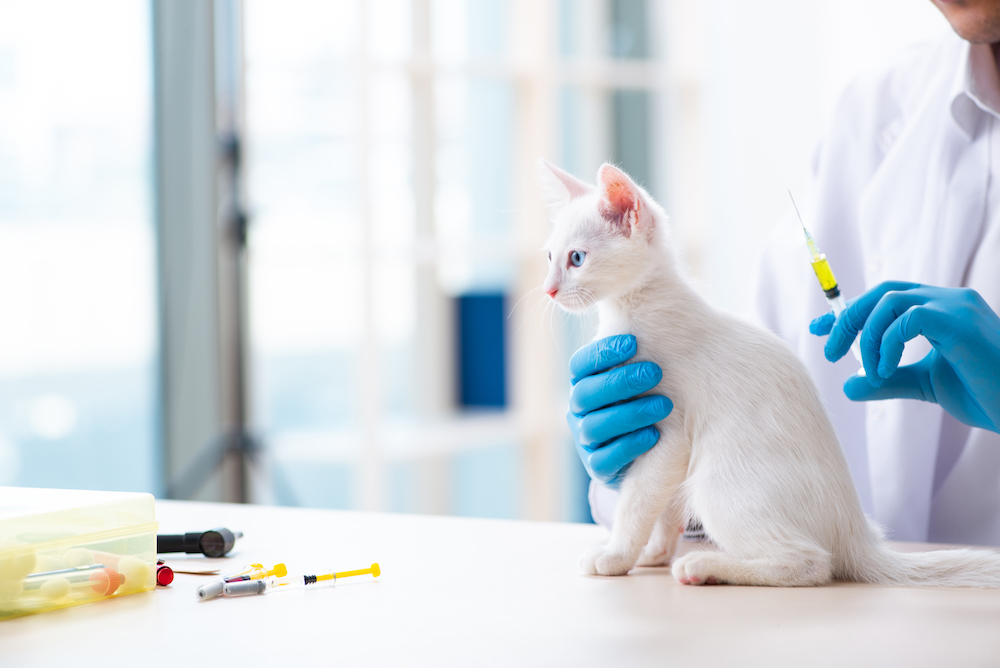Importance of Vaccinating Your Pet
February 22, 2022

Vaccinating your pet is the best way to take preventative measures to protect your pet’s health. Countless vaccinations are available for your pet, and some are more important to carry out than others – this can vary depending on your pet as well as infection rates of particular diseases in your area. For cats and dogs, there are a core set of vaccinations that should be given to your pet in order to benefit them the most.
How do Vaccinations Work?
Vaccinations contain antigens of particular diseases which are then introduced to the body. This triggers a response from the immune system to produce antibodies that are able to fight off the specific disease that was introduced. Vaccinations allow a pet’s immune system to be better prepared to destroy organisms that are harmful and can make your pet ill.
What are Core and Non-Core Vaccinations?
Core vaccinations are considered essential for all pets and protect them from highly infectious and largely common diseases and conditions. Non-core vaccinations, on the other hand, are not essential for every pet. They may be recommended for your pet and given in circumstances where there is a genuine concern for the risk of exposure to infection for your pet.
What Vaccinations Should You Give to Your Cats?
There are four particular vaccinations that are considered core vaccinations for cats.
The feline panleukopenia vaccination prevents feline parvovirus. This can be a severe cause of hemorrhagic gastroenteritis in which fluid seeps into the gut and leads to excessive vomiting and diarrhea and can often be fatal.
The feline herpes vaccination and the feline calicivirus vaccination are often combined due to the fact that they are both main causes of upper respiratory tract infections, also referred to as cat flu.
The rabies vaccine is one of the most common vaccines for pets and is given to cats to prevent the viral disease that infects the central nervous system of your cat and often leads to death. Rabies can also be passed on to humans from pets, and so it is important for not just your pet, but also for your own protection, that you ensure your cat is vaccinated against rabies.
The following are some of the non-core vaccinations that are available for your cats:
Feline leukemia virus
Chlamydophila felis
Bordetella bronchiseptica
Feline immunodeficiency virus
What Vaccinations Should You Give to Your Dogs?
There are also four core vaccinations for dogs that are extremely important for you to have done for your pet.
Canine parvovirus is similar to feline parvovirus, in which the disease attacks the intestines and cause severe vomiting and diarrhea. It is important to vaccinate your dog against canine parvovirus as it is highly infectious and can often prove to be fatal.
The distemper vaccination helps to protect your dog from canine distemper, which largely affects the respiratory system, immune system, and central nervous system as well as various other systems in your dog’s body.
Canine hepatitis is highly infectious and in severe cases can be fatal, so vaccinating your dog against it can be extremely beneficial. It affects the liver and causes vomiting, diarrhea, and abdominal pain as well as countless other symptoms in your dog.
Like with pet cats, it is crucial to vaccinate your dog against rabies for your benefit as well as for the benefit of your pets. Since rabies attacks the central nervous system, it can have a serious impact on the brain and ultimately lead to death.
The following are a few examples of non-core vaccinations that are available for your dog, should either you or your vet decide that your dog would benefit from them:
Borrelia burgdorferi
Bordetella bronchiseptica
Leptospira bacteria
Vaccinations are highly important as they allow you to effectively manage your pet’s health and well-being. Your pet does not need to be vaccinated against every disease; however, it is important to organize appointments with your vet for the core vaccinations as soon as possible and discuss whether your pet could potentially benefit from any of the non-core vaccinations, too.
For more information about the importance of vaccinating your pet, or to schedule an appointment to discuss pet vaccines, please contact our veterinary team at Lone Oak Animal Clinic in Paducah, Kentucky at (270) 554-0385.


